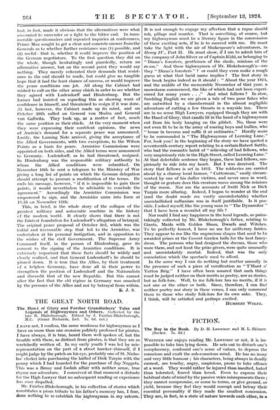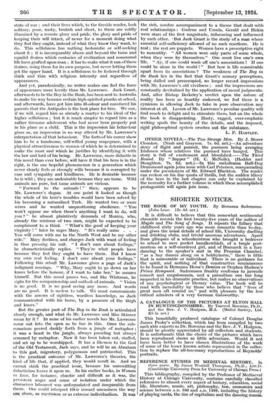FICTION. . - The Boy in the Bush. By D.
H. Lawrence and M. L. Skinner. (Seeker. 7s. 6d.) WHETHER one enjoys reading Mr. Lawrence or not, it is im- possible to take him lying down. He sets out to disturb one's complacency, confound one's sense of values, to depress the conscious and exalt the sub-conscious mind. He has no irony and very little humour ; his characters, being always in deadly earnest, are touchy, angry, suspicious, prone to take offence at a word. They would rather be injured than insulted, hated than tolerated, feared than loved. Even to express their habitual state of mind by the passive vbice misrepresents them ; they cannot compromise, or come to terms, or give ground, or yield, because they feel they would corrupt and betray their essential personality if they made the smallest concession. They are, in fact, in a state of nature towards each other, in a
state of war ; and their lives which, to the fireside reader, look solitary, poor, nasty, brutish and short, to them are coldly illumined by a remote glory and pride, the glory and pride of keeping their will intact, of never for a moment- doing 'what they feel they ought, instead of what they know they want, to do. This selfishness has nothing hedonistic or self-seeking about it ; it is incomparably above and beyond the tame and squalid desires which centuries of civilization and communal life have grafted upon man ; it has to make what it can of these desires, using them for its own purpose, but never letting them get the upper hand. It is a selfishness to be fostered through thick and thin with religious intensity and regardless of appearances.
And yet, paradoxically, no writer makes one feel the force of appearance more keenly than Mr. Lawrence. Jack Grant, afterwards to be the Boy in the Bush, has been sent to Australia to make his way because certain high-spirited pranks at school, and afterwards, have got him into ill-odour and convinced his parents that the Antipodes is the best place for him. We can, if we will, regard him as already a martyr to his ideal of the higher selfishness ; but it is much simpler to regard him as a rather tiresome adolescent who had never been properly put in his place as a child. This is the impression his behaviour gives us, an impression in no way altered by Mr. Lawrence's interpretation of that behaviour. The facts of his career show him to be a handsome, self-willed young scapegrace, with a physical attractiveness to women of which he is determined to make the most and which he justifies by identifying it with the law and lord of his being. Mr. Lawrence, more didactic in this novel than ever before, will have it that his hero is in the right, is the one• hopeful phenomenon in a generation which never clearly feels or strongly wills because it is corrupted by ease and sympathy and kindliness. He is desirable because he is wild •; they are undesirable because they are tame. Wild animals are pure, but tame animals are vicious.
" Forward to the animals ! " then, appears to be Mr. Lawrence's slogan. At one point it looked as though the whole of his hero's troubles would have been solved by his becoming a naturalized Turk. He wanted two or more wives and he wanted unquestioning obedience. " You won't oppose- me when- there's anything. L want to do, will you ? " he ahnost plaintively demands of Monica, who, already the mistress of two men, might be expected to be complaisant to a third. " What's the good of keeping your virginity ! " later he urges Mary. " It's really mine . . . You will come with me to the. North West and be my other wife." Mary declines, and charges Jack with want of feeling in thus pressing his suit. " I don't care about feelings," he characteristically replies. " They're what people have because they feel they ought to have them. But I know my oivn real feeling. I don't care about your feelings." Following this rebuff Mr. Lawrence gives a page of Jack's indignant musings. " Why, Mary ought to go down on her knees before the honour, if I want to take her," he assures himself. But this mood passes too, and like Whitman, he sighs for the companionship and outlook of animals. " Vision is no good. It is no good seeing any more. And words are no good. It is useless to talk. We must communicate with the arrows of sightless, wordless knowledge, as Jack communicated with his horse, by a pressure of the thigh and knees."
But the greater part of The Boy in the Bush is articulated clearly enough, and what do Mr. Lawrence and Miss Skinner mean by it ? In none of his earlier novels has Mr. Lawrence come out into the open as he has in this. Once the sub- conscious peered darkly forth from a jungle of metaphor ; it was a beast in the jungle, always prowling but always screened by metaphor. Now it has been taken out, stuffed, and set up to be worshipped. It has a likeness to the God of the Old Testament, Jack says, and he will be an Abraham to this god, migratory, polygamous and patriarchal. This is the practical outcome of Mr. Lawrence's theories, the kind of life that, if applied, they would result in. And we cannot shirk the practical issue, because his unremitting didacticism forces it upon us. In his earlier books, in Women in Love, for instance, chaotic and difficult as it was, the persistent anger and sense of isolation under which the characters laboured was unformulated and inseparable from them. One could interpret tlkir inward uneasiness the way one chose, as mysticiam or as extreme individualism. It was the rich, sombre accompaniment to a theme that dealt with real relationships : Gudrun and Ursula, Gerald and Birkin were stars of the first magnitude, influencing and influenced by each other. But Jack Grant is the study of a man whose essential self-sufficiency allowed of no such reactions. He is real ; the rest are puppets. Women have a prescriptive right to nonentity. " All women were only parts of some whole, when they were by themselves." One must live one's own life. " Ay, if one could wash off one's associations 1 If one could be alone in the world " But how is life conceivable apart from its associations ? The weakness of The Boy in the Bush lies in the fact that Grant's sensory perceptions, being dulled and preoccupied, no longer record impressions with Mr. Lawrence's old vividness ; and the impressions are constantly devitalized by the application of moral judgments. And, after Bishop Berkeley's verdict upon the nature of reality has been so heartily endorsed, we feel there is n cynicism in allowing Jack to take in pure observation any interest at all. Lovers of Mr. Lawrence's peculiar quality will find much to delight and to stimulate them, but on the whole the book is disappointing. Hasty, ragged, over-emphatic writing spoils the beauty of the details, and the imposed, rigid philosophical system crushes out the substance.
L. P. HARTLEY.



































 Previous page
Previous page